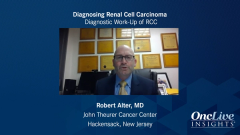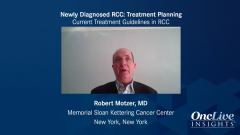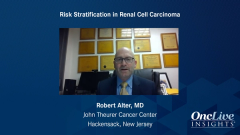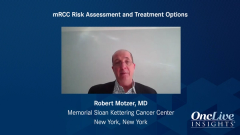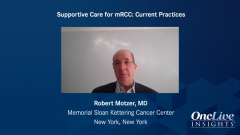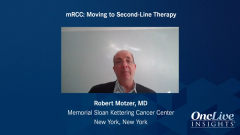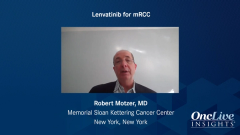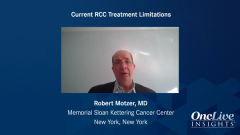
Supportive Care and Systemic Therapy for RCC
Advice to health care providers on when to refer patients for further assessment of potential renal cell carcinoma and insight on the types of diagnostic tests used to help confirm a diagnosis in the era of molecular testing.
Episodes in this series

Robert Motzer, MD: For the most part, historically, most patients with RCC [renal cell carcinoma] have presented to the urologist. It has largely been for evaluation of a renal mass. The referral has been from various caregivers, including primary care physicians or gynecologists. Usually the renal mass is identified either in a setting of hematuria or by an imaging study that is done to assess a different condition, and they identify a renal mass. The first responder for kidney cancer, historically, and the person who’s been primarily involved with management, is the urologist. The care has largely been surgical regarding resecting the tumor.
There are some patients who present with metastasis. About 25% of people with the initial diagnosis of kidney cancer will have stage IV disease, meaning they have distant metastasis. Sometimes these metastases can be asymptomatic, or they can produce symptoms. The symptoms that occur can include pain in the bone area, since this tumor metastasizes frequently to bone. It can present with respiratory symptoms, hemoptysis, or a cough, because of the frequency of lung metastasis. It can present with a mass in the abdomen and enlarged left supraclavicular lymph node. These are common presentations.
The other thing that has been noteworthy for renal cell carcinoma is the occurrence of paraneoplastic syndromes. Historically, paraneoplastic syndromes have been ascribed to renal cell carcinoma. They include anemia, polycythemia, and hypercalcemia. There’s another paraneoplastic syndrome called Stauffer syndrome, which presents as elevated liver function test abnormalities in the absence of metastasis.
Of the various different malignancies, renal cell carcinoma has been the one most notably connected with paraneoplastic syndromes and was actually referred to as the internist’s tumor, because of the wide variety of different manifestations of this cancer and its insidious nature and presentation that eventually leads to a diagnosis.
Robert Alter, MD: As medical oncologists, patients often come to us having already been given a diagnosis of renal cell carcinoma or a renal mass. We are suddenly given a sense of ease when talking to patients about a diagnosis they have. But the community oncologists or community primary care physicians may not have that luxury. When we do have patients who come to our clinic and we are having the ability to take care of these patients with a renal mass, the standard work-up has to come into play.
You must get a CBC [complete blood count], a chemistry panel, an LDH [lactate dehydrogenase test], a urinalysis; you want to gauge the amount of bleeding in the urine. Hematuria will be a very important factor. We perform CT scans or MRIs [magnetic resonance imaging tests] of the abdomen and pelvis, chest x-ray, and perhaps a CT scan of the chest, depending on symptoms.
And if clinically indicated, using an elevated alkaline phosphatase [test] with patients having pain, getting patients to have a bone scan, imaging the brain either via a CT scan or an MRI, and performing a CT of the chest, again, depending on suspicion, symptoms, or an abnormal chest x-ray, is recommended.
Ultimately, we need to do a biopsy. If the patient has advanced disease, sometimes you can biopsy the site of the metastases as compared to having to do a kidney biopsy. But it really is important that a work-up be done so you can identify the extent of the patient’s disease status prior to consideration of therapy. If the patient has a central tumor, you want to make sure you are not dealing with a urothelial carcinoma as opposed to a renal cell carcinoma, so a urine cytology.
Ureteroscopies and biopsies may be important as well to document the patient’s histology prior to concluding that you are dealing with a renal cell carcinoma.
Robert Motzer, MD: In terms of the genomics that are attributed to renal cell carcinoma, the key genomic finding has been loss of chromosome 3p and mutation of the VHL gene. For clear cell carcinoma, that is really the path of mnemonic mutation that is associated with this tumor. There have been other mutations that have been found in RCC. One is BAP1, another is SETD2, and a third is PBRM1. These are all chromosomes located on 3p. They have been more recently ascribed and are of importance prognostically.
It is possible PBRM1 is associated with a favorable prognosis, and that BAP1 is associated with an adverse prognosis. For the most part, kidney cancer is one of the few malignancies where we really have not been able to identify targetable mutations in the genomic structure. The one that is targeted is the VHL mutation. Essentially, all patients with clear cell carcinoma either have a mutation of this gene or else some sort of silence by a different process like methylation.
Genomics are important in diagnosis in terms of looking for VHL mutation and chromosome 3p abnormalities. But they really have not been able to, aside from the use of VEGFR inhibitors, been able to direct our therapy. In medical management, we recommend that, across the board for malignancies, genomic profiling be performed.
Regarding RCC, there is some prognostic information that can be derived from the genomic mutations. But aside from that, it is really a work in progress. We are looking to see if we can identify better signals for our therapy based on the genomic abnormalities of the patient.
Transcript edited for clarity.


